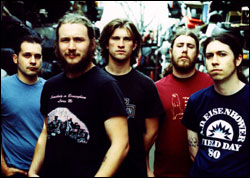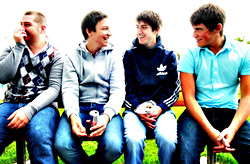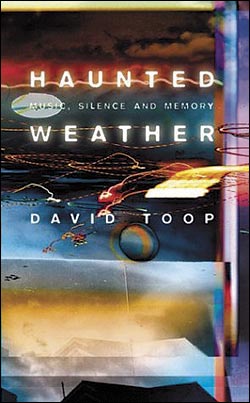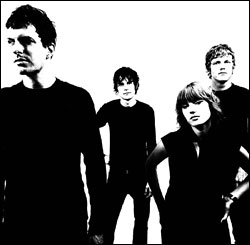WE’LL NEVER GET away from the ’60s. No matter how much space we put between ourselves and that blessed/accursed decade, no matter how many technological innovations arise, no matter how many wars and revolutions, the ’60s, like a bad case of herpes, are going to come back to haunt us again and again. Just lookand listenaround. More than 30 years after David Bowie and Roxy Music supposedly consigned the “we decade” to dust (and 25 after punk rock pointed out that its corpse was beginning to stink), ’60s revivalism rages uncheckedin the proliferation of jam bands, the garage-rock explosion, tie-dyed earth monkeys, and weekend modseven in life itself, as folks routinely (and correctly) compare Iraq to Vietnam and any peace-oriented event that draws more than 10 people inevitably propels the ponytailed codgers and codgerettes in the house into paroxysms of reminiscence. Hell, when Simon and Garfunkel get back together, even if only for a tour, you know shit’s gotta be bad.
Fortunately, there’s more to the ’60s mania currently gripping the planet than regurgitated nonsense and rampant nostalgia. Take My Morning Jacket. As the Louisville, Ky., quintet’s new It Still Moves (RCA) reveals, they’re not strictly a neo-’60s band; they simply derive the bulk of their inspiration from some of the earthier manifestations of rock’s Jurassic era, especially Neil Young & Crazy Horse, Let It Bleed-era Rolling Stones, and the Band’s first two albums. Normally, such a well-worn constellation of influences would damn a contemporary rock ensemble to humble bar status or, worse still, the field-yup fiefdoms lorded over by the likes of Big Head Todd, where people who go to shows usually buy two beers at a timeone to drink, and one to slosh around in the air. Luckily, MMJ mastermind Jim James is fancy enough with the pastiche and production to keep the proceedings well away from either of those conceptual corrals. Plus he’s really good at experimentation, one ’60s trick that doesn’t usually see all that much play among revivalists.
Much of MMJ’s charm springs from James’ flair for reconciling seemingly disparate elements: the forlorn Orbisonian melody and chirpy chordsstraight out of Frankie Valli and the Four Seasons’ “Sherry”that form the verse of album-opener “Mahgeetah,” for instance. Not one to settle for just one novel juxtaposition when he can have a whole fucking bunch of them, James tosses a half-tempo chorus reminiscent of the Beach Boys circa Smiley Smile into the sonic Cuisinart, along with some ebullient bluegrass picking, a Rolling Stones-ish turnaround or two, even a dramatic stop-and-start interlude wrapped around the song’s closing guitar solo so nicely that it sparkles in its good-old-fashionedness like a brand-new Nehru jacket rescued from a forgotten corner of a department store warehouse. My Morning Jacket aren’t the only band stringing mini-movements together, late ’60s-style, in the service of expanded song structures, but they do it welland minus the proggish abruptness of Deerhoof or the piratical bombast of the Coral. And they use reverb as glue better than anyone in rock.
UNFORTUNATELY, James’ machinations don’t always yield results as refreshing as “Mahgeetah.” “Golden,” with its Sam Cooke-meets-the Band gambit, somehow comes out all wrong, like Grandaddy doing a John Denver cover. And the endless procession of “Watch us party like it’s 1969” moves can get a bit fatiguing after a while. The band veers dangerously close to colliding with “Free Bird” on “One Big Holiday,” only to pull out of what seems like a tailspin straight into the fiery Velveeta pit with a landing as delicate as a swallow’s. They seamlessly integrate early Springsteen slow-jam-inflected guitar flourishes with a Sabbath-meet- the-Allman Brothers freak-out on “Run Thru”pretty nifty, especially given the acidic four-on-the-floor interlude that leads to the song’s climax. For all of its spectacle, though, “Run Thru” provides a prime example of the album’s greatest weaknessits lyrics. James doesn’t necessarily write bad ones, he just tends toward the abstruse and solipsistic. Undoubtedly, “Oh shit run thru the ghetto/They will hear you/ Mornin’ bell tolls at home/Rings loud back where I come from/Calls me back/Often times I would hope and pray/Then faith came my way” means something to him. It might even mean something to the rest of the band. Unfortunately, they fail to convey whatever that something is to the listener, though the combination of apparent urgency in the words and James’ relaxed delivery does create an interesting kind of tension.
In the end, it’s this unwillingness to engage their audience lyrically that makes My Morning Jacket less a neo-’60s band and more like a highly intelligent, five-piece sampling device. But they know they can’t turn the clock back, nor would they probably do so, given the option. The one element of the ’60s that can never be regained is innocence, and if My Morning Jacket found themselves with a surfeit of that commodity, they probably wouldn’t be able to make such elegant music in such a relatively concise manner. Plus, you can’t help but suspect that they’re abundantly familiar with the 1960s’ one enduring gift to mass culture. No, not outdoor festivalsweed. And an ounce of weed is worth a pound of innocence anytime.








